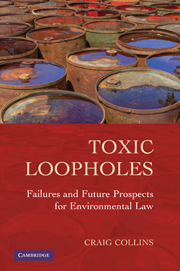Book contents
- Frontmatter
- Contents
- Dedication
- Introduction: Crime Without Punishment
- 1 The EPA – Policing or Protecting Polluters?
- 2 The Clean Air Act – Gasping for Breath
- 3 The Clean Water Act – Up Sh*t Creek
- 4 Superfund and RCRA – Toxic Trash
- 5 TSCA – The Toothless Tiger
- 6 The Endangered Species Act – Noah's Ark or Titanic?
- 7 Planetary Problems – Cooperation or Collapse?
- Conclusion: A Glimmer of Hope
- Bibliography
- Index
7 - Planetary Problems – Cooperation or Collapse?
Published online by Cambridge University Press: 05 June 2012
- Frontmatter
- Contents
- Dedication
- Introduction: Crime Without Punishment
- 1 The EPA – Policing or Protecting Polluters?
- 2 The Clean Air Act – Gasping for Breath
- 3 The Clean Water Act – Up Sh*t Creek
- 4 Superfund and RCRA – Toxic Trash
- 5 TSCA – The Toothless Tiger
- 6 The Endangered Species Act – Noah's Ark or Titanic?
- 7 Planetary Problems – Cooperation or Collapse?
- Conclusion: A Glimmer of Hope
- Bibliography
- Index
Summary
America's environmental laws are poorly enforced and riddled with loopholes. Yet they definitely rank a cut above global environmental accords. After all, if a wealthy superpower like the United States can't protect its environment, how can a fractious gallimaufry of nations hope to prevent planetary ecological crises like climate disruption and plummeting biodiversity? Negotiating agreements between scores of rivalrous nations is like herding cats. Ultimately, nations recognize no lawmaking authority greater than themselves and there is no global government capable of enforcing the few environmental treaties that achieve ratification. Therefore, many international relations scholars contend that establishing effective environmental agreements is a virtually futile endeavor.
PROSPECTS FOR ENVIRONMENTAL COOPERATION – FOUR THEORIES
Neorealism, which is arguably the most prominent theory of international relations, considers such ventures dubious and potentially hazardous. Neorealist theory asserts that all nations are entrenched in an anarchic international system lacking any global peacekeeping authority. Neorealists maintain that this situation compels states to prioritize security and elevate power above all other assets. Power is the nation's capability to defend its interests (especially its very existence) and get what it wants. And because power can be meaningfully measured and employed only in relation to potential threats, obstacles and adversaries – it is relative.
The dog-eat-dog nature of world politics envisioned by the neorealists discourages prolonged cooperation between nations. Temporary security alliances may prove advantageous for bolstering power and overcoming mutual rivals.
- Type
- Chapter
- Information
- Toxic LoopholesFailures and Future Prospects for Environmental Law, pp. 145 - 232Publisher: Cambridge University PressPrint publication year: 2010



